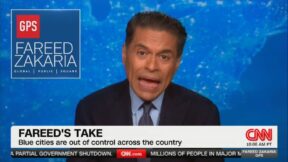WATCH: NYT’s Charles Blow Calls Out Jake Tapper’s ‘Horrible Question’ About Gun Violence
New York Times columnist Charles Blow went off on what he called a “horrible question” that CNN’s Jake Tapper asked of Senator Cory Booker this week about the gun massacre in Virginia Beach, a question that is frequently asked in the wake of such tragedies.
On this week’s edition of HBO’s Real Time with Bill Maher, host Bill Maher noted that “Cory Booker was on with Jake Tapper, and Jake Tapper asked him, a couple of times, what in your plan would have stopped the massacre that we had last week at Virginia Beach, and Cory Booker took a very long time to not be able to answer that question.”
“Can I just say this? Journalists have to stop asking that horrible question,” Blow said. “That is a horrible question.”
“Because what we’re doing is picking out one incident out of 30,000 deaths per year and saying ‘How could you solve this one thing?'” Blow continued. “That is not the objective of gun control. The objective of gun control is to reduce capacity to kill people who should not be killed. And once you reframe it that way, maybe the proposal I have today will not solve that problem, but it cuts into this massive number of people that we are losing to gun violence.”
The question rankles because it smacks of pro-gun talking points, but as Blow points out, it also suffers from a serious logical flaw. It’s like asking a scientist what his cure for lung cancer would do to prevent pancreatic cancer.
Where I might differ with Blow’s analysis, though, is that there is no such thing as a horrible question if you have a great answer. Tapper’s question provided Booker with an opportunity to quash the talking point.
Never mind that from pro-gun advocates, this is a pure bad-faith argument that doesn’t come up when gun massacres feature details for which specific gun laws would have made a difference, such as gun storage laws that could have prevented the Sandy Hook massacre and many other preventable child deaths, or a ban on extended magazines that could have saved the life of 9 year-old Christina Taylor Green.
Faced with examples like these, they revert to some other talking point, often by simply arguing that people will ignore these laws, so why have them? It doesn’t matter how much data you throw at these talking points, there will always be another one to take their place.
But even if you grant the flawed premise of the question, asked in good faith by a journalist testing gun policy arguments, there is a better answer than attacking the question. When you attack the question, you are signaling that you don’t have a good answer, and there is a good answer to this question, every time.
For example, the Virginia Beach shooter used extended magazines, which allowed him to fire many more rounds without reloading. Without those, some of the 12 deaths might have been avoided. And based on the pure hypothetical of the question being posed, there’s no way to know if the shooter would have engaged in this massacre at all without that advantage in firepower.
In fact, Booker could have argued that any number of his policies might have dissuaded the shooter from carrying out this act. A federal firearms registry might have made him think twice, a more stringent background check might have raised a red flag, a waiting period might have allowed him to cool off, and if he had taken steps to avoid the stricter laws, those laws might have caused him to be intercepted.
More broadly, if gun laws that have proven effective at reducing gun violence were more prevalent, this shooter might have felt the weight of an entirely different gun culture, or an entirely different gun culture might have made him stand out more.
Journalists will always test politicians with tough, even loaded questions. The best solution to this is to demand better answers.
Watch the clip above, via HBO.
This is an opinion piece. The views expressed in this article are those of just the author.
New: The Mediaite One-Sheet "Newsletter of Newsletters"
Your daily summary and analysis of what the many, many media newsletters are saying and reporting. Subscribe now!






Comments
↓ Scroll down for comments ↓